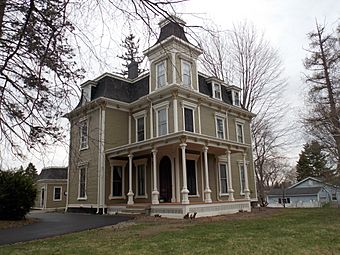Leonard Bond Chapman House facts for kids
Quick facts for kids |
|
|
Leonard Bond Chapman House
|
|
 |
|
| Location | 90 Capisic Street Portland, Maine |
|---|---|
| Area | 0.6 acres (0.24 ha) |
| Built | 1866 |
| Architectural style | Italianate, Mansard |
| NRHP reference No. | 80000228 |
| Added to NRHP | April 23, 1980 |
The Leonard Bond Chapman House is a historic home located at 90 Capisic Street in Portland, Maine. It was built between 1866 and 1868. This house is a great example of Second Empire architecture in the area. It is also special because it was the home of Leonard Bond Chapman, a famous historian from Portland. The house was added to the National Register of Historic Places in 1980.
About the Chapman House
The Chapman House stands in Portland's western Rosemont neighborhood. You can find it on the south side of Capisic Street. It is between Bancroft and Frost Streets.
What It Looks Like
This house is made of wood. It has two and a half stories. A special type of roof, called a mansard roof, gives it a full third floor. At the front corner, there is a tall, square tower. This tower has three stories and its own mansard roof. The tower's roof has a unique shape, with a small center and wide, flaring edges.
The main roof has decorative brackets. These are small supports, often found in the Italianate style. A porch wraps around the front of the house. It also goes around the side where the tower is. The porch roof is held up by carved round posts. It also has decorative brackets, just like the main roof. Behind the house, there is an old carriage house. It was built at the same time and has a similar design.
Its History
The Leonard Bond Chapman House was built between 1866 and 1868. It is a rare example of the Second Empire style in Portland. This style is known for its mansard roofs.
The house was built for Leonard Bond Chapman. He was born in Portland. His main job was owning a plant nursery. But his real passion was history. He loved collecting old papers and learning about Portland's past. He was a very active member of the Maine Historical Society. For this group, he wrote many articles. These articles covered all parts of Portland's long history.



